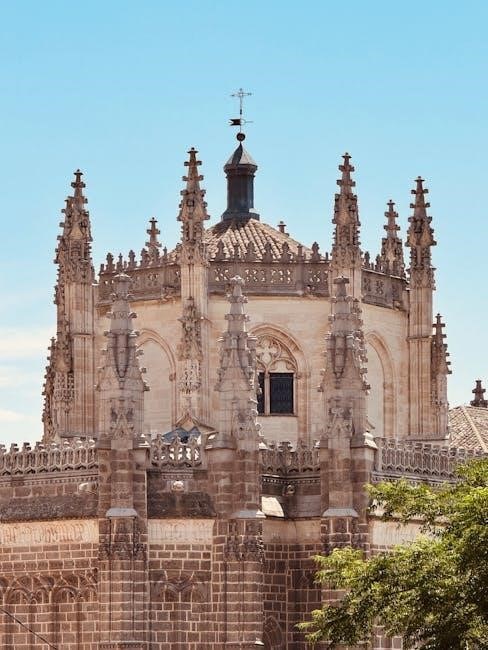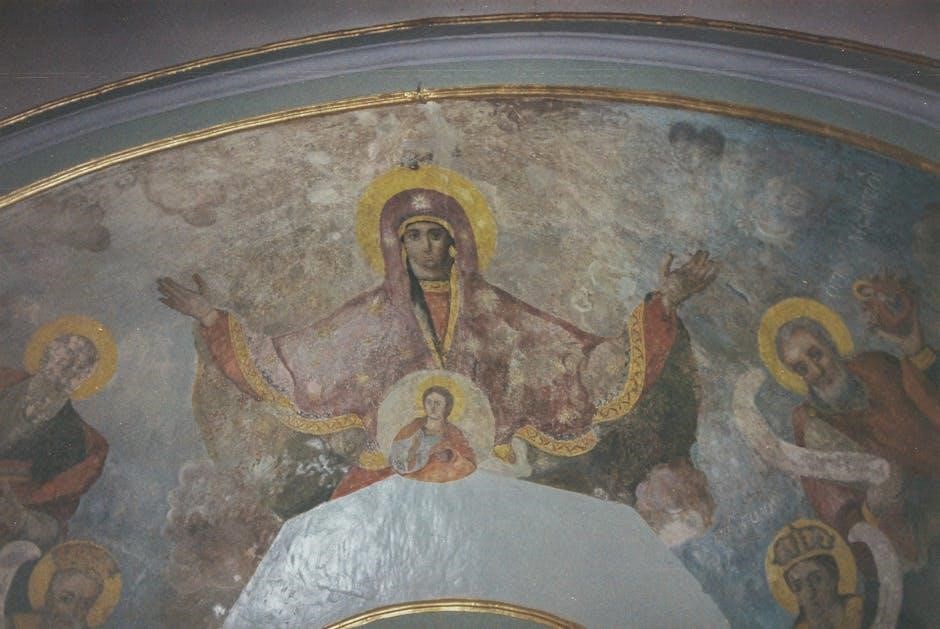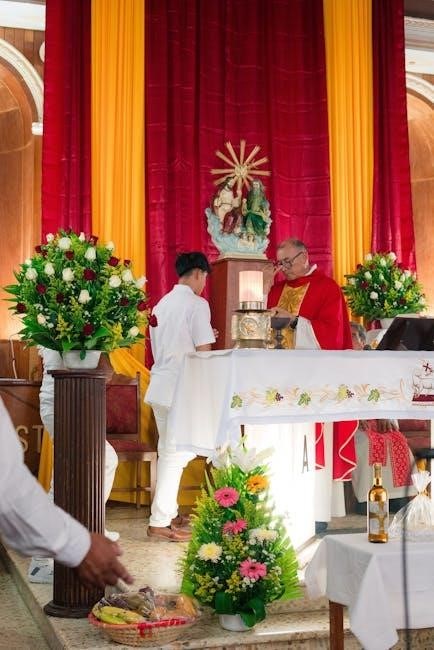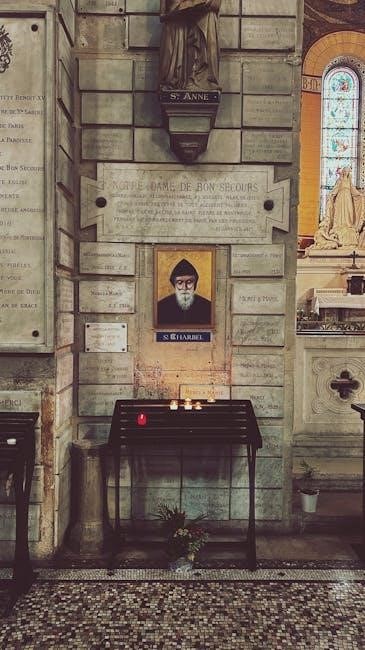Pre-Cana is a Catholic marriage preparation program designed to help couples build a strong foundation for their sacramental union. It involves group or individual sessions led by priests or deacons, focusing on essential topics like communication, finances, and faith. The program often includes questionnaires to explore compatibility and discuss future goals, ensuring couples are well-prepared for the commitments of married life.
1.1 Overview of Pre-Cana
Pre-Cana is a Catholic marriage preparation program designed to guide couples toward a sacramental union. It typically involves group or individual sessions led by priests or deacons, exploring key topics such as communication, finances, and faith. Couples often complete questionnaires to assess compatibility and discuss future goals. The program emphasizes open dialogue and mutual understanding, helping couples clarify their expectations and responsibilities. It is a cornerstone of Catholic marriage preparation, ensuring couples are spiritually and practically ready for the lifelong commitment of marriage.
1.2 Importance of Pre-Cana in Catholic Marriage Preparation
Pre-Cana is essential for fostering a deep understanding of the sacrament of marriage within the Catholic faith. It provides couples with tools to strengthen communication, resolve conflicts, and align their values and goals. By addressing financial, emotional, and spiritual aspects, Pre-Cana prepares couples for the lifelong commitment of marriage. It also ensures they understand the Church’s teachings and expectations, fostering a strong foundation for their union. This program is vital for building a faith-centered marriage and ensuring couples are spiritually and emotionally prepared for their vows.

Requirements and Eligibility
Couples must complete Pre-Cana at least six months before their wedding. A recent baptismal certificate and meeting with a priest or deacon are required.
2.1 Who Needs to Attend Pre-Cana?
Engaged couples planning a Catholic wedding must attend Pre-Cana. Both partners, whether Catholic or not, are required to participate. Baptized individuals need a recent baptismal certificate, while converts may need additional documentation. The program is led by a priest or deacon, ensuring couples are prepared for the sacrament of marriage. Attendance is mandatory for those seeking to marry within the Catholic Church, regardless of their faith background or marital history.
2.2 Documentation Required for Pre-Cana
Documentation for Pre-Cana typically includes a recent baptismal certificate (issued within six months) for Catholic individuals. Non-Catholic partners may need an affidavit of baptism or a letter from their church. Couples must also provide proof of freedom to marry, such as affidavits or prior marriage dissolution documents. If applicable, a civil marriage license or annulment decree may be required. These documents ensure the validity of the sacramental marriage and compliance with Catholic Church regulations.
Structure of Pre-Cana Sessions
Pre-Cana sessions combine group discussions and individual meetings, led by priests or deacons, utilizing questionnaires to explore compatibility and future goals, fostering open dialogue and reflection.
3.1 Group Sessions vs. Individual Meetings
Pre-Cana sessions are conducted in both group and individual formats, each offering unique benefits. Group sessions provide a supportive community environment, fostering shared experiences and collective learning. They often include discussions on universal topics like communication and financial planning. Individual meetings, led by priests or deacons, allow for personalized guidance, addressing specific concerns and deepening reflection. Both formats may incorporate questionnaires to explore compatibility and future goals, ensuring couples engage thoughtfully in their preparation for marriage. This balanced approach helps couples build a strong, faith-centered foundation.
3.2 Typical Agenda of a Pre-Cana Session
A typical Pre-Cana session begins with an introduction and prayer, followed by presentations on key topics such as communication, finances, and faith. Couples often engage in group discussions or interactive exercises to explore their values and goals. The agenda may include breakout sessions for individual reflection or couple-specific discussions. Questionnaires are frequently used to assess compatibility and encourage open dialogue. The session concludes with a review of the wedding ceremony and the importance of the marriage vows, ensuring couples are spiritually and practically prepared for their union.

Key Topics Covered
Pre-Cana sessions address essential topics such as communication, conflict resolution, and financial planning. Discussions also focus on faith, family values, and raising children within a Catholic context.
4.1 Communication and Conflict Resolution
Pre-Cana emphasizes effective communication and healthy conflict resolution skills to strengthen relationships. Couples explore their communication styles, practice active listening, and learn to address disagreements constructively. Sessions often include exercises to identify strengths and areas for growth, fostering mutual understanding and respect. The program also highlights the importance of empathy and forgiveness, encouraging couples to resolve conflicts in a way that honors their faith and commitment to one another. These tools help build a resilient foundation for navigating life’s challenges together.
4.2 Financial Planning and Management
Pre-Cana addresses the importance of financial planning and responsible money management in building a stable marriage. Couples discuss budgeting, saving, and debt management, fostering transparency about financial priorities. The program encourages open dialogue about spending habits and long-term financial goals. Questionnaires and discussions help identify potential challenges, ensuring couples are aligned in their financial values. Faith is integrated into these conversations, emphasizing stewardship and mutual support in managing resources responsibly for a secure and harmonious future together.
4.3 Family and Children
Pre-Cana explores family values and parenting styles, helping couples align their visions for raising children. Discussions include the role of faith in child-rearing and fostering a supportive home environment. Couples are encouraged to reflect on their beliefs about discipline, education, and balancing family life with personal goals. The program also addresses openness to life and the Church’s teachings on family planning, ensuring couples are prepared to embrace the responsibilities and joys of parenthood together.
4.4 Faith and Spirituality
Pre-Cana emphasizes the importance of faith and spirituality in a Catholic marriage, encouraging couples to deepen their shared prayer life and commitment to their faith. Sessions explore how to integrate Catholic teachings into daily life and decision-making. Couples are invited to reflect on their spiritual values and how they will nurture their faith together. The program also addresses the role of the Church in their relationship and the importance of unity in faith when facing life’s challenges. This fosters a strong spiritual foundation for their union.
The Role of the Priest or Deacon
The priest or deacon provides guidance, facilitates discussions, and ensures couples understand the sacrament’s significance, helping them integrate faith into their marriage.
5.1 Guidance and Counseling
The priest or deacon offers personalized guidance, addressing the couple’s unique needs and concerns. They use questionnaires to explore compatibility and discuss future goals, fostering open dialogue. Emphasizing faith and sacramental values, they help couples understand marriage as a vocation. Counseling focuses on communication, conflict resolution, and financial planning, ensuring a strong marital foundation. The goal is to prepare couples spiritually and practically, integrating faith into daily life and fostering a lifelong commitment to each other and their Catholic beliefs.
5.2 Facilitating Discussion and Reflection
Priests or deacons create a supportive environment for couples to reflect on their relationship and future. Through guided discussions and questionnaires, they encourage open dialogue about values, goals, and challenges. These sessions help couples understand each other’s perspectives and deepen their commitment to marriage. Reflection on faith, communication, and shared responsibilities is emphasized, fostering a strong spiritual and emotional connection. The goal is to ensure couples are thoughtfully prepared for the sacrament of marriage and its lifelong journey together.
Marriage Vows and Ceremony
The marriage vows and ceremony are the sacred culmination of Pre-Cana, where couples publicly commit to lifelong fidelity and love, embodying the sacrament’s divine essence.
6.1 The Questions of Consent
The Questions of Consent are a pivotal part of the Catholic marriage ceremony, where couples publicly declare their free and unconditional commitment to one another. These questions, posed by the priest or deacon, ensure both partners willingly and knowingly enter into the sacrament. They affirm mutual fidelity, partnership, and openness to children, reflecting the Church’s teachings on marriage as a lifelong, sacred bond.
6.2 The Catholic Wedding Ceremony
The Catholic wedding ceremony is a sacred ritual where the couple exchanges vows and rings, witnessed by a priest or deacon. It often includes a Nuptial Mass, emphasizing the sacramental nature of marriage. The ceremony incorporates biblical readings, prayers, and the Liturgy of the Eucharist, symbolizing the couple’s commitment to a lifelong, faith-centered union. The priest blesses the marriage, reinforcing its divine origin and purpose, and the congregation joins in celebrating the newlyweds’ sacramental bond.

Interfaith Marriages
Interfaith marriages involve unique challenges, requiring thoughtful discussion about religious beliefs and practices. The Catholic Church provides guidance to ensure a harmonious blend of faith traditions.
7.1 Considerations for a Catholic and Non-Catholic Union
A Catholic and non-Catholic union requires thoughtful consideration of religious beliefs, practices, and family values. Both partners must engage in open dialogue about their faith traditions and how they will blend these in their marriage. The Catholic Church encourages couples to explore these differences through Pre-Cana counseling, ensuring mutual respect and understanding. Questionnaires and discussions often address these topics, helping couples navigate potential challenges and align their commitments with the teachings of the Catholic Church.
7.2 The Role of Faith in Interfaith Marriages
Faith plays a pivotal role in interfaith marriages, requiring open communication and mutual respect. Couples must discuss how their beliefs will influence daily life, decision-making, and raising children. The Catholic Church emphasizes understanding and blending traditions while maintaining commitment to shared values. Pre-Cana counseling helps couples explore these dynamics, ensuring a harmonious union that honors both partners’ spiritual backgrounds. This reflection fosters a strong, faith-centered marriage, aligned with Catholic teachings while respecting the non-Catholic partner’s beliefs.
Practical Tools and Strategies
Pre-Cana provides couples with practical tools, including communication exercises, financial planning resources, and conflict resolution techniques. These strategies help build resilience and foster a lifelong, faith-centered marriage.
8.1 Building a Strong Marital Foundation
Building a strong marital foundation involves fostering open communication, mutual respect, and a shared commitment to faith. Pre-Cana emphasizes understanding each other’s values, expectations, and goals. Couples engage in exercises that promote emotional intimacy and teamwork. Financial planning and conflict resolution strategies are introduced to equip couples with practical skills for navigating life together. By addressing key areas of marriage, Pre-Cana helps couples establish a stable and loving relationship rooted in faith, ensuring a lifelong, sacramental union.
8.2 Navigating Challenges Together
Pre-Cana equips couples with strategies to address life’s challenges collectively. Open communication and conflict resolution techniques are emphasized to foster understanding and unity. Financial planning tools help manage economic pressures, while shared faith provides spiritual strength. Couples learn to support each other through life’s ups and downs, fostering resilience and mutual respect. By addressing potential issues early, Pre-Cana prepares couples to face challenges with empathy, patience, and a deepening commitment to their sacramental bond.

Parish-Specific Programs
Parish-specific Pre-Cana programs vary in structure and focus, offering tailored guidance for couples. Some parishes provide interactive workshops, while others emphasize one-on-one counseling. Enrollment processes differ, ensuring personalized preparation for marriage.
9.1 Variations in Pre-Cana Programs Across Parishes
Pre-Cana programs vary significantly across parishes, reflecting local needs and traditions. Some parishes offer group sessions with interactive workshops, while others emphasize individual counseling. Certain parishes incorporate retreats or mentorship with experienced couples. Enrollment processes and documentation requirements also differ, with some parishes offering online registration and others requiring in-person meetings. These variations ensure that couples receive personalized preparation tailored to their unique circumstances and faith journey.
9.2 Enrolling in Pre-Cana
Enrolling in Pre-Cana typically begins several months before the wedding date. Couples must provide necessary documentation, such as recent baptismal certificates and completion of a marriage preparation program. Registration processes vary, with some parishes offering online forms and others requiring in-person meetings. Early enrollment is encouraged to ensure ample time for preparation and scheduling. This step is crucial for a smooth transition into the sacrament of marriage.
Ongoing Formation and Support
Post-marriage support includes resources like retreats, counseling, and community activities to enrich relationships. Continuing education helps couples deepen their faith and marital commitment over time.
10.1 Post-Marriage Support and Resources
Post-marriage support is crucial for sustaining a healthy and faith-filled relationship. The Catholic Church offers various resources, including retreats, counseling, and community activities, to help couples navigate life’s challenges. Many parishes provide access to questionnaires and tools that identify strengths and potential areas for growth in the marriage. These resources emphasize ongoing communication, faith deepening, and mutual support. Couples are encouraged to remain active in their faith community, leveraging these resources to strengthen their bond and live out their sacramental commitment fully.
10.2 Continuing Education and Enrichment
Continuing education and enrichment are vital for fostering a lifelong commitment to marriage. The Catholic Church provides couples with resources such as workshops, retreats, and faith-based programs to deepen their understanding of marriage. These initiatives often include questionnaires and reflective exercises to explore topics like communication, finances, and spirituality. By participating in these enrichment opportunities, couples can strengthen their relationship, grow in faith, and build a resilient foundation for their future together. Such programs emphasize ongoing learning and spiritual growth as essential components of a thriving marriage.
Frequently Asked Questions
Common questions about Pre-Cana include its purpose, eligibility, and required documentation. Couples often inquire about session formats and the role of faith in marriage preparation. These FAQs address concerns and provide clarity on the program’s structure and benefits, helping couples understand its significance in their journey toward a sacramental marriage. The questions also cover practical aspects like timing and enrollment processes.
11.1 Common Questions About Pre-Cana
Common questions about Pre-Cana include inquiries about required documentation, such as baptismal certificates, and the role of priests or deacons in the process. Couples often ask about the structure of sessions, whether they are group-based or individual, and the topics covered, such as communication, finances, and faith. Many wonder if Pre-Cana is mandatory and how it prepares them for a sacramental marriage. These questions highlight the practical and spiritual aspects of the program, ensuring couples understand its purpose and benefits.
11.2 Addressing Concerns and Misconceptions
Common concerns about Pre-Cana often revolve around its necessity and relevance in modern relationships. Some couples worry that the program is outdated or overly religious, while others question its effectiveness in addressing real-life challenges. Misconceptions, such as believing Pre-Cana is only for deeply religious couples, are also prevalent. Addressing these concerns involves highlighting the program’s practical benefits, such as improving communication and financial planning skills, while emphasizing its role in strengthening the sacramental bond. The goal is to reassure couples that Pre-Cana is a valuable, inclusive resource for building a lasting marriage.
